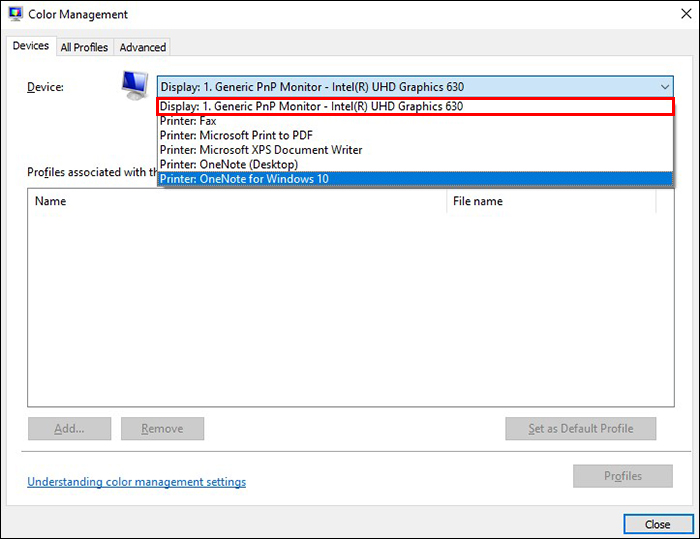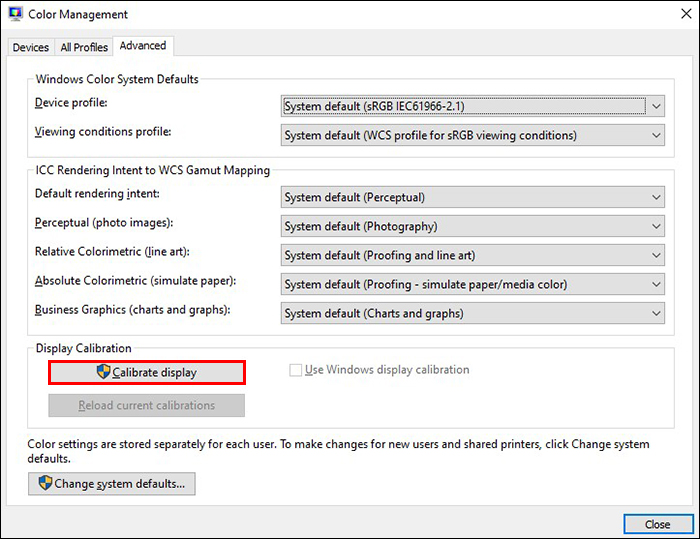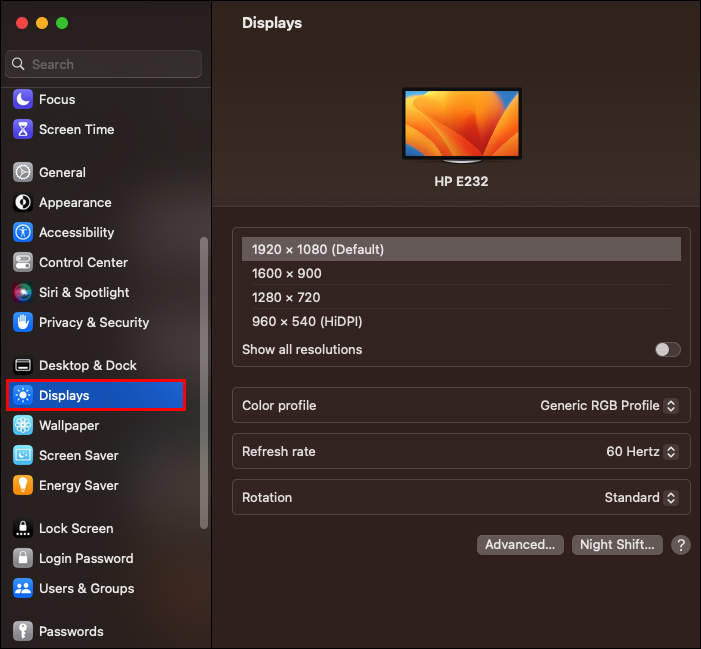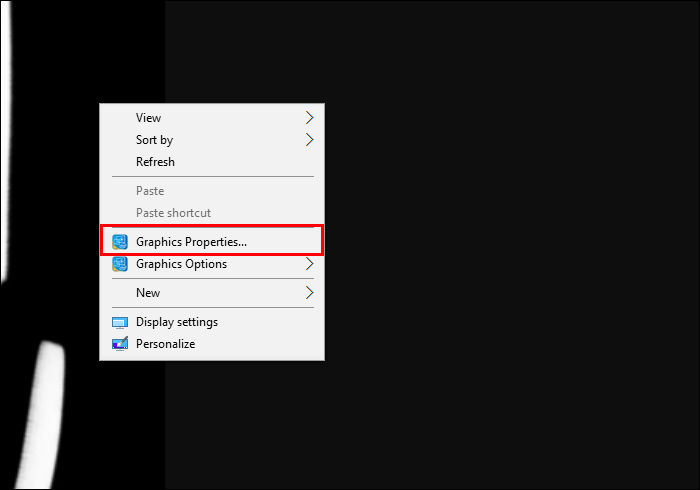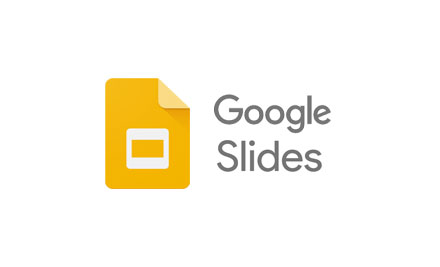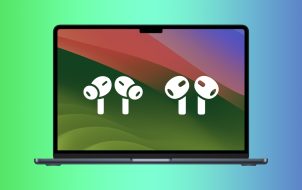If you’re a gamer or multitasker, you might be using a multiple monitor setup. But what if you want your screens colors to match? Getting monitors to match can be tough, especially if they’re from different manufacturers or product lines. If you’re mixing monitors, it’s almost impossible to get them to match perfectly.
If you’re looking to match screen colors on your multiple monitor setup, you’ve come to the right place. This article will explain how to do that using different operating systems.
Operating System
You can adjust the color settings at the operating system level. Windows and MacOS offer OS level color calibration tools that can be adjusted. Here’s how it’s done:
- Open “Color Management.”
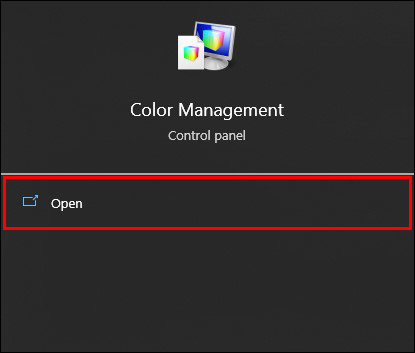
- Select “Display” from the drop-down menu and click on “Device.”

- Click on “Use My Settings for This Device.” Next, click “Add.” There are many options, and you’ll need a custom profile for each monitor.

- Select the monitor under the device and repeat the process. Select the same profile and go to the advanced tab.

- Click on “Calibrate Display.”

- Open the wizard that allows you to adjust advanced controls and set the profile. Once all monitors are using the same profile, go back to the first section and fine tune settings with hardware controls.
MacOS
The process is similar on a Mac:
- Click on the system preferences icon.

- Choose “Display” and then “Color Setting” on the right.

- Find the profile you want and click “Calibrate.” There’s a wizard that will help you step by step.
- Click “Continue” and follow the process to “Target White Point” and then unclick “Use Native White Point” to adjust it manually. Continue through the wizard.Repeat the process for all the displays.
Adjust Your Graphics Adapter Settings
For more exact options on Windows, you can go to the settings application. Most use Intel but AMB is similar.
Intel HD Graphic Control Panel
This is for Intel integrated graphics.
- Right click on an empty area of the desktop to open the context menu.

- Click on “Graphics Properties.”

- The next steps vary depending on model and Intel GPU but find the main display menu. Click “Color Settings” and choose other screens by clicking on “Color Management.”

- Repeat the process on your other screens and combine them with the hardware controls to get the color you want.
NVIDIA Control Panel
You’ll use this if your PC has NVIDIA GPU.
- Right click on your desktop and then on NIVDIA control panel.

- Click on “adjust Desktop Color Settings.”

- Make sure that “Use NIVDIA Settings” is enabled and make the adjustments you want.

- Click on “Apply” to save the settings for the current monitor, and then “Select a New Monitor” and repeat the process.

AMD Radeon Settings
You’ll use this if your PC has AMD or ADU.
- Right click on the desktop and click on AMD Radeon settings.

- Click “Display settings” then find the color icon on the right and make the adjustments you want.

- Click “Display” at the top of the window and repeat the process for each monitor.
Tools to Adjust the Color on Your Monitors
There are tools that you can use to adjust the color on each of your monitors independently. These tests are great. You can manually change certain aspects and hopefully are able to get a closer color match. Below you’ll find five websites that are great for testing your monitor’s color.
Photo Friday
Photo Friday is a site used to adjust the brightness and contrast of the screen and is a quick and easy way to adjust the color on your monitor.
Lagom LCD Monitor Test Pages
Lagom allows you to change the settings of your monitor to get the color that you’re looking for. You’re able to adjust the brightness, contrast, clock/phase, sharpness, and gamma settings.
Online Monitor Test
These are tests to fix screen colors. They test brightness, contrast, production of color gradients, and if you have damaged pixels. There are multiple sites to do this. Below are two great choices:
- EIZO is a site that only works for desktops not mobile devices. It lets you carry out a variety of tests.
- Monteon is a site that works for desktops and mobile devices and is an easy way for you to adjust the settings on your monitors.
Monitor Calibration and Gamma Assessment
Photoscienta is a good website for this test. It tests color saturation and hue. It tells you the relationship between the brightness of the screen and the numerical value of the pixel.
W4ZT
W4ZT is a site that allows you to test the color, gray scale, and gamma options that are also mentioned above. You can adjust brightness and contrast.
FAQs
What is the most accurate way to match colors?
Using a monitor calibration tool because it analyzes the color as emitted by the screen.
Is there an easy way to match multiple screens?
Monitor display controls. You could try to adjust the color settings on each monitor to see if you can get them to match. This is free and easy to do.
Is color calibration important?
It depends on how important it is to you for your screens color to match on all of your monitors. Monitor calibration will make things more consistent. There are also monitor calibration kits that are great for professional photographers. The kits can be expensive though.
Are there any apps for you to use to match screen colors?
ScreenBright and Display Tuner are two of the better ones, but they may not work on all monitors. These are free apps for Windows.
Is there anything you should do manually?
Monitor brightness. This affects color brightness and tone and is the only thing that can’t be adjusted via software.
Match Your Screen Colors
By using the above techniques, you can adjust your monitors so that there’s no longer a discordant variation between one panel and the next. Keep in mind that even going through the steps to match your screen colors, there may still be slight differences and not a perfect match.
Do you use multiple monitors and color match the screens? What tools did you use and how did they work for you? Let us know in the comments section below.
Disclaimer: Some pages on this site may include an affiliate link. This does not effect our editorial in any way.
